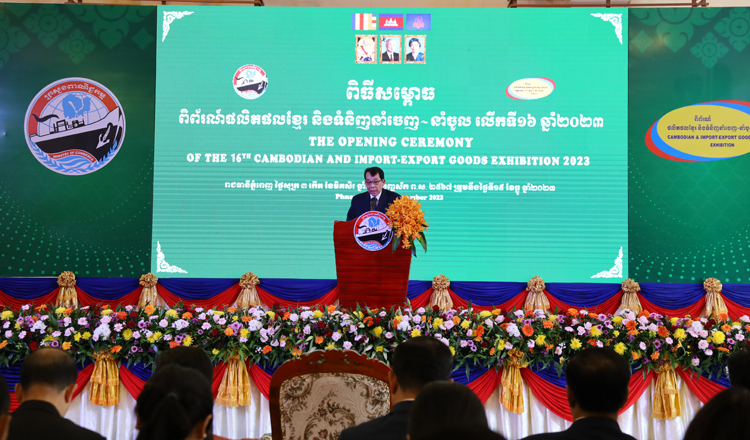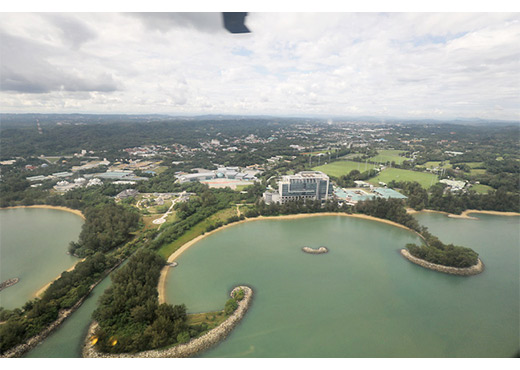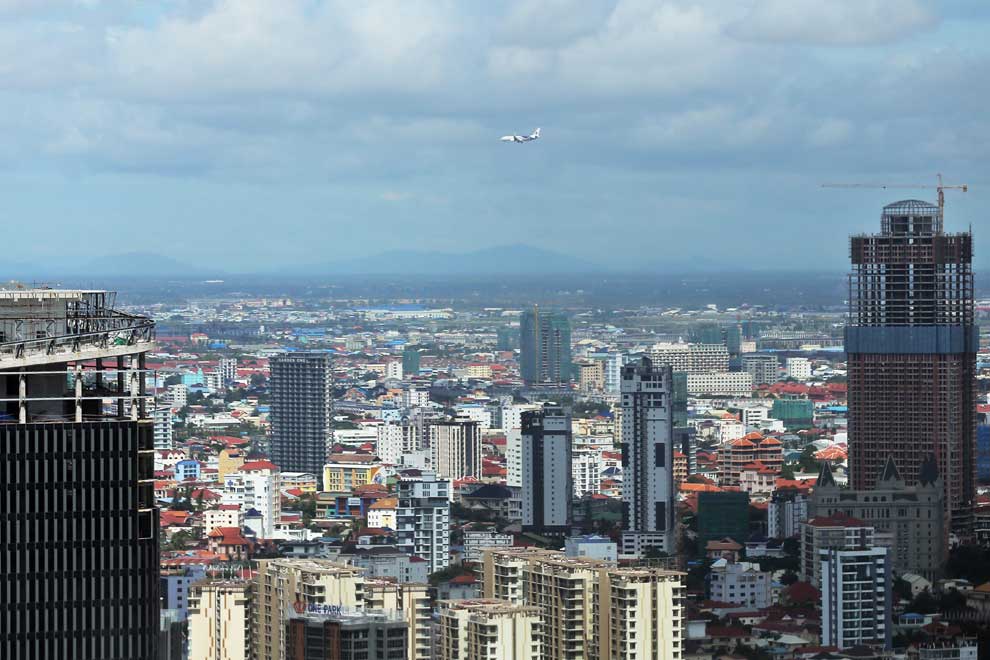The Indonesian Embassy in Phnom Penh participated in the16th Cambodian and Import-Export Goods Exhibition (CIE) held at the Koh Pich Exhibition and Convention Center, Phnom Penh (15-18/12). CIE is an annual international trade exhibition organized by the Ministry of Commerce of Cambodia.
Through the Indonesian Pavilion, the Indonesian Embassy in Phnom Penh promoted Indonesian export products, ranging from food and beverages to herbal medicines and batik. With a total area of 108 square meters consisting of 10 booths, the Indonesian Embassy in Phnom Penh became the foreign representative with the highest number of booths.
Ambassador Santo Darmosumarto of the Republic of Indonesia in Phnom Penh expressed hope that the concrete participation of the embassy could encourage an increase in Indonesian product exports in Cambodia.
Ten Indonesian companies and distributors in Cambodia participated in the exhibition, including PT. Dami Sariwana (herbal medicine manufacturer), K-1000 (distributor of Indomie and Teh Botol Sosro), Kino Cambodia, Chhivtimex Group (distributor of PT. Eagle Indo Pharma), V-Consolidated Co. Ltd (distributor of Inaco Jelly Drink), DK Enterprise (distributor of PT. Dolphin Food & Beverages Industry), Khmer Richie Foods (Distributor of PT. Serena Indopangan and PT. Siantar Top), Chip n’ Rolls (distributor of PT. Manohara Asri), as well as Golden Pearl and Manira (distributor of Indonesian batik).
The participation of the Indonesian Embassy in Phnom Penh in the 16th CIE is an ongoing effort to promote and increase Indonesian product sales in Cambodia. In addition to products from PT. Dami Sariwana, all the products displayed in the exhibition have entered Cambodia and are available for purchase in markets, minimarkets, and supermarkets.
To read full article, click here.
Author: Indonesia Embassy in Cambodia
Source: Khmer Times
Micro and large-sized companies reported expectations of better business conditions in October 2023 compared to the previous month in terms of the index by business size.
Generally, these businesses felt positive regarding their performance with expectations of more activities and increased customers from higher demand for goods and services.
Meanwhile, medium-sized companies indicated slight pessimism with expectations of lower domestic spending due to people travelling overseas. Small-sized businesses reported similar business conditions in October 2023 to the previous month.
These details were revealed yesterday in Brunei Darussalam’s Business Sentiment Index (BSI) for October 2023 published by Brunei Darussalam Central Bank (BDCB).
The index is based on surveys conducted on over 500 micro, small, medium and large businesses from 11 economic sectors in the Sultanate across all districts.
The monthly index is designed to measure the level of business confidence/sentiment in the country covering various aspects, including current and future business conditions investments employment of workers, as well as costs of running the businesses. The BSI serves as a leading macroeconomic indicator with its forward-looking element in the country.
Source: Borneo Bulletin
Read the full article here
Bandar Seri Begawan was fourth highest ranked city in Asean after Singapore, Kuala Lumpur and Johor Bahru in the Mercer’s 2023 Quality of Living report published recently.
According to the report, Singapore was the highest ranked city in ASEAN at 29th out of 241 destinations. Kuala Lumpur and Johor Bahru in Malaysia ranked 89th and 107th place.
The Sultanate’s capital Bandar Seri Begawan is at 112th place, falling from its 106th ranking in 2019.
Meanwhile, Bangkok, Thailand ranked 124th, Manila, Philippines ranked 135th, Jakarta, Indoneisa 148th, Hanoi, Vietnam 167th, Vientiane, Laos 180th and Yangon, Myanmar in 226th.
Globally, Vienna ranked first in the report for providing a high quality of living for international employees in 2023.
The Mercer’s Quality of Living data assesses the practicalities of daily life for expatriate employees and their families in assignment locations worldwide.
According to the report, following years of unprecedented and unpredictable times, the factors that influence the world’s economy have a direct impact on the quality of living.
“The current global landscape is affected by geopolitical turmoil, natural disasters and other economic challenges, all of which have significant implications for cities and their ability to attract and retain talent,” said Mercer’s global head of mobility Yvonne Traber.
Source: Borneo Bulletin
Read the full article here
Japanese telecommunications company, NTT Docomo Inc., member of the world-renowned Nippon Telegraph and Telephone Group (NTT Group), has expressed the company’s desire to invest in the Cambodian telecommunications sector.
The company’s intentions cropped up during a meeting between President of NTT Docomo Inc., Li Motoyuki and Prime Minister Hun Sen on the sidelines of the ASEAN-Japan Commemorative Summit for the 50th Year of ASEAN-Japan Friendship and Cooperation on Tuesday evening.
In the course of the meeting, Li appraised Mr Hun Manet and members of the Cambodian Chamber of Commerce (CCC), on the company’s telecommunications activities in Japan and internationally, which include the provision of 4G and 5G services, satellite and mobile systems.
Li also detailed NTT Docomo’s partnership with NTT Group to research and develop 6G technology for future rollout and expressed the company’s intention to expand its investment in Cambodia.
Mr Hun Manet welcomed the investment suggestions made by NTT Docomo Inc. in the telecom sector saying the Royal Government of Cambodia has mandated the prioritization of the nation’s digital economy development.
This is as stipulated in the Government’s Pentagonal Strategy Phase I for Cambodia’s socio-economic development, he said.
To read full article, please click here.
Author: James Whitehead
Source: Khmer Times
Cambodia stands at the forefront of foreign direct investment (FDI) in Southeast Asia, anticipating a robust influx of capital in 2024, buoyed by a solid economic recovery.
The International Monetary Fund (IMF) projects the country’s growth to reach 6.1% next year, as highlighted in the annual FDI Standouts Watchlist from fDi Intelligence, the industry analysis division of Financial Times (FT) Group Ltd.
The report underscores that the study, evaluating the macroeconomic and FDI trends of the world’s top 50 FDI destinations using data from the IMF and fDi Markets, identifies countries poised to enter the new year with strong momentum, as the world continues to navigate an uneven post-pandemic recovery.
“Asia has performed admirably in this year’s Watchlist, with six countries in the top 10: Cambodia, leading the list, followed by the Philippines, Iraq, Kazakhstan, Azerbaijan and India. Only three African countries feature in the top 10: Kenya, Namibia and Morocco. Serbia is the sole country outside Asia and Africa to secure a spot in the top 10, ranking ninth,” stated the report.
Chea Vuthy, deputy secretary-general of the Cambodian Investment Board (CIB) and the Cambodian Special Economic Zone Board (CSEZB) at the Council for the Development of Cambodia (CDC), noted at a recent business forum that the country boasts economic potential, peace, security, and political and economic stability.
He emphasised the crucial role of the private sector in driving national economic development.
“We see that FDI annually approaches $4 billion. In 2020, ASEAN experienced a steep 40% decline, but our FDI remained stable at around $3.6 billion,” said Vuthy.
He added that Cambodian investors took the lead in the first half of the year, buoyed by confidence in the country’s investment climate and “trust in its leadership”.
To read full article, click here.
Author: May Kunmakara
Source: The Phnom Penh Post
























